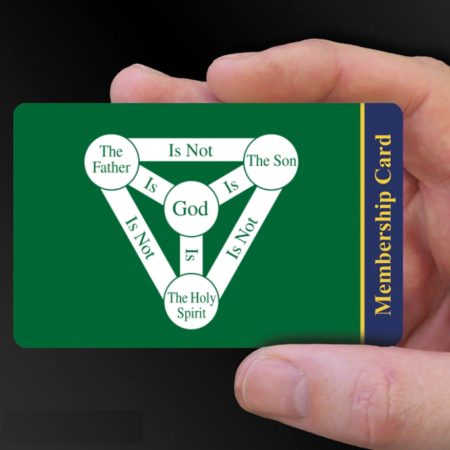Podcast: Play in new window | Download
Subscribe: Spotify | Email | RSS
In this episode I interact with a listener comment on podcast 231. Then I present the audio from an orientation video for new members of the Trinity Club.
 What is required to be a member in good standing of the Trinity Club?
What is required to be a member in good standing of the Trinity Club?- What is not required?
- And what benefits does club membership entitle one to?
The video answers all of these questions.
Are you in the club? Are you willing to Say and Sign? Why or why not?
Links for this episode:
 Hans Küng on New Testament theology
Hans Küng on New Testament theology- analytic theologians on the Trinity
- What is the Trinity?
- 10 steps towards getting less confused about the Trinity – #6 get a date – part 2
- podcast 26 – Pastor Sean Finnegan on “the Holy Spirit” – Part 2
- podcast 25 – Pastor Sean Finnegan on “the Holy Spirit” – Part 1
- podcast 108 – Dr. Robert M. Bowman Jr. on triadic New Testament passages – part 2
- podcast 107 – Dr. Robert M. Bowman Jr. on triadic New Testament passages – part 1
- podcast 2 – the “Athanasian Creed”

- Francis J. Beckwith, Return to Rome: Confessions of an Evangelical Catholic
- Francis J. Beckwith, “The Trinity” (written when he was an evangelical Protestant)
- John Henry Cardinal Newman
- Sean Finnegan, “Restorationist Manifesto“
- biblicalunitarian.com
- Randal Rauser, “Theology as a Bull Session“
- Matthew 24:36; John 14:10; Luke 4:14; Matthew 9:6-9; John 5:19; Mark 1:13; James 1:13; John 3:16; Mark 1:9-11; Matthew 28:19.
- This week’s thinking music is “Show Me (Instrumental Version)” by Josh Woodward.
- nicStage’s vcr.wav
Related posts:
podcast 30 - The Council of Nicea
Letter to a former student
podcast 102 - Dr. Brian Leftow on perfect being theology
Jesus and “God” - Part 8 - Some recent Jewish scholars on the biblical Shema
Answer to Angeliqua's "The 1-2 Punch Against the Charge that Trinity is Tritheism"
You're Foolin' Yourself and You Don't Believe It - Part 2
Negative Mysterianism Explained
Christology and Heresy 4 - Nestorianism Proper (JT)
R.I.P. Dr. Larry Hurtado
podcast 203 - White, Qureshi, and Zacharias on YouTube


Hi Sean,
John 1 v 1 states that “In the beginning was the Word, and the Word was with God and the Word was God”
If the Word was God and God is immutable then this implies that the statement “the Word is God” must be true and a necessary logical inference of the statement that the Word was God.
Is this an ambiguous statement which needs to be unpacked?
In that case the statement “the Father is God” , which all Unitarians would agree with, must also be an ambiguous statement which needs to be unpacked, or not?
Paul,
“If the Word was God and God is immutable then this implies that the statement ‘the Word is God’ must be true and a necessary logical inference of the statement that the Word was God… In that case the statement ‘the Father is God’…must also be an ambiguous statement which needs to be unpacked…”
Thank you for making an assertion that seems more clear. So are you a Sabellian then, rather than a Trinitarian? As you may know, one of the reasons that Harner, Dixon, and others were motivated to find a new solution to John 1:1c than the one that had been accepted and promoted since the 1930s when Colwell wrote his article is because they came to believe that if QEOS is definite there then that destroys the Trinity.
As Paul Dixon said on page 2 of his DTS thesis:
“The importance of this thesis is clearly seen in the above example (John 1:1) where the doctrines of the deity of Christ and the Trinity are at stake…if [QEOS] is just as definite as the articular construction following the verb because, ‘the dropping of the article…is simply a matter of word order,’ then the doctrine of the Trinity is denied.” (The Significance of the Anarthrous Predicate Nominative in John)
So if QEOS is definite, as it is in “the Word was God”, which is so clear that it needn’t be “unpacked”, then “the Trinity is denied”, according to Dixon and others.
Do you agree with Dixon and others on this point? Do you understand why he and others believe that a definite QEOS is out at John 1:1c?
I personally have no problem with a definite QEOS there, because that no more demands that the LOGOS must be God Himself than Psalms 45:6 demands that an earthly king must be God Himself, even though the king is called “O God” by God Himself. The biblical terms for God were applied to agents of God all the time during the biblical period, and this wasn’t understood to suggest that such agents actually were God Himself. Rather, it was done as a literary technique to show that such agents functioned in God’s behalf, doing “God-things” for Him.
FYI, I wrote a series on John 1:1c that discusses some of the more glaring problems Harner’s and Dixon’s solution, here:
https://kazlandblog.wordpress.com/2016/05/16/and-the-word-was-god-qualitatively-torturing-language-and-grammar-to-preserve-a-preconceived-view-part-1/
https://kazlandblog.wordpress.com/2016/05/16/and-the-word-was-god-qualitatively-torturing-language-and-grammar-to-preserve-a-preconceived-view-part-2/
https://kazlandblog.wordpress.com/2016/05/16/and-the-word-was-god-qualitatively-torturing-language-and-grammar-to-preserve-a-preconceived-view-part-3/
https://kazlandblog.wordpress.com/2016/05/16/and-the-word-was-god-qualitatively-torturing-language-and-grammar-to-preserve-a-preconceived-view-part-4/
Hi Dale,
Thanks for the podcast.
I recently listened to podcast 194 – God: One Person or Three? Sanders vs. Buzzard debate.
In his opening remarks Dr. Fred Sanders said “I am dedicated to the doctrine of the Trinity because I believe Jesus is God”.
I thought about this and it seems to me that most apologists who hold to the doctrine are of this same mindset. They are dedicated to the doctrine and have fully committed themselves to defending it. That seems clear. But then the question arises: how far is one willing to go with this “dedication”?
Let’s compare that with another type of dedication. Virtually all those who are married would willingly declare that they are dedicated to their spouse.
However there are many divorces even among believing Christians. After all you can always get another wife or husband and the social cost of doing so is not that high within most congregations. They would still be called a Christian and would not be looked down upon or expelled. But what would happen if someone said that they no longer accepted the doctrine? How would they be viewed? Would they be chastised, lose their positions, called names or condemned?
Thanks! It seems like you are describing quite a few of the trinitarian guests that you have interviewed on the podcast, Dale. But I guess you would not want to name names!
Hi Dale. I really enjoy the podcast. 10 years ago, we would have agreed on the doctrine of the Trinity. I was raised a Biblical Unitarian (Christadelphian), but converted to trinitarianism at the age of 32. I’ve done a little reading on the subject and would be love to discuss it with you. I’m not a liberal or a fundamentalist, nor do I don’t judge non trinitarians as non Christians. I still have family that are Unitarian. I’m sure you get these requests a lot, so if not, I look forward to listening in the future. God bless!
Comments are closed.